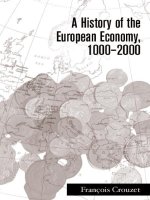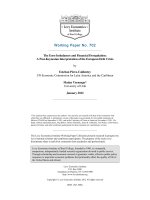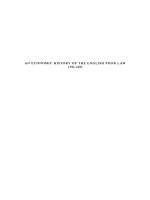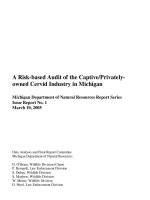beattie - false economy; a surprising economic history of the world (2009)
Bạn đang xem bản rút gọn của tài liệu. Xem và tải ngay bản đầy đủ của tài liệu tại đây (4.62 MB, 339 trang )
FALSE
ECONOMY
ALAN BEATTIE
$26.95
Why do some economies and societies
crash and burn, while others are buffeted
by storms and yet still recover?
Can
we analyze the fates of countries in a way
that
will
help us analyze the fault lines and
successes that can make or
break
a civiliza-
tion, a city, or a culture? In False
Economy,
Alan Beattie weaves together elements of eco-
nomics, history, politics, and human stories,
revealing that governments and countries make
concrete choices that determine their destinies.
He opens larger questions about the choices
countries make, why
they
make them or are
driven to make them, and what these choices
can mean for the future of our global economy
as
we go forward
into
uncharted territory.
Economic history involves forcing together
disciplines that fall naturally in different di-
rections, the universal explanation versus the
individual narrative. But Beattie has written
a
lively
and lucid book that engagingly and
thought-provokingly marries the two disciplines
and
reveals their interdependence. Along the
way, you'll discover why Africa doesn't grow
cocaine, why our
asparagus
comes from Peru,
why your keyboard spells QWERTY, and why
giant pandas are living on borrowed time. . . .
Beattie
uses extraordinary stories of eco-
nomic triumph and disaster to explain how
some countries have gone wrong
while
oth-
ers
have gone right, and why it's so difficult to
change course once you're on the path to ruin.
0904
ALAN
BEATTIE
graduated
from
Balliol
College, Oxford,
with
a
degree
in
history. After
taking
a
master's degree
in
economics
at
Cam-
bridge,
he
worked as an economist at the Bank
of England and
then
joined the Financial
Times
in 1998. Currently the paper's world trade edi-
tor,
he
writes about economics, globalization,
and development.
RlVERHEAQ
BOOKS
7
Jacket
design
O
2009 Keenan
Photograph
of
the author
O
Financial Times/Charlie Bibby
Visit
our
website
at:
www.riverheadbooks.com
a
member of Penguin
Group
(USA) Inc.
www.penguin.com
"In this fascinating and insightful hook. Alan Beattie brilliantly illustrates
how countries* choices determine and. in some
cases,
sadly undermine
their
prospects for generations. This masterly global economic journey is a
must read for all those keen to understand how today's surge in state activ-
ism
will impact national and international futures."
—MOHAMED
A.
EL-ERIAN
CEOofPIMCOand
author
of
When
Markets Collide
"Beattie's
analytics show facts can be a force for change. Give people the
facts,
and they'll do the right thing."
—
BONO
lead
singer
of U2 and
cofounder
of the
antipoverty
organization
ONE
"This
is a wonderfully liberating book. Alan Beattie flies in the face of one
of
the most dearly held ideas in the social sciences:
that
today's economic
outcomes—which countries are rich, and which remain poor—have deep
and largely immutable roots in history, geography, or culture. Beattie's
narrative shows
that
there
is plenty of room for choices, and
that
history
rewards those governments
that
make the correct ones."
—
DAN!
RODRTK
professor
of
international
political economy,
John
F.
Kennedy
School of
Government,
Harvard
University
ISBN
978-1-59448-866-5
FALSE
ECONOMY
ECONOMY
A SURPRISING
ECONOMIC HISTORY
OF
THE
WORLD
ALAN BEATTIE
RIVERHEAD
BOOKS
a
member of Penguin
Group
(USA)
Inc.
New York 2009
RIVERHEAD
BOOKS
Published
by the
Penguin Group
Penguin Group
(USA)
Inc.,
375
Hudson Street,
New
York,
New
York 10014,
USA •
Penguin Group (Canada),
90 Eglinton Avenue East, Suite 700, Toronto, Ontario
M4P
2Y3, Canada
(a
division
of
Pearson Canada
Inc.) *
Penguin Books
Ltd, 80
Strand, London WC2R
0RL,
England
*
Penguin Ireland,
25 St
Stephen
s
Green,
Dublin
2,
Ireland
(a
division
of
Penguin Books
Ltd) *
Penguin Group (Australia),
250
Camberwell Road,
Camberwell, Victoria 3124, Australia
(a
division
of
Pearson Australia Group
Pty Ltd) *
Penguin Books
India
Pvt Ltd, 11
Community Center, Panchsheel Park,
New
Delhi-110 017, India
*
Penguin Group
(NZ),
67 Apollo Drive, Rosedale, North Shore 0632,
New
Zealand
(a
division
of
Pearson
New
Zealand
Ltd) *
Penguin Books (South Africa)
(Pty) Ltd, 24
Sturdee Avenue, Rosebank, Johannesburg 2196, South Africa
Penguin Books
Ltd,
Registered Offices:
80
Strand, London WC2R
0RL,
England
Copyright
©
2009
by
Alan Beattie
All rights reserved.
No
part
of
this book
may be
reproduced, scanned,
or
distributed
in any
printed
or
electronic form without permission. Please
do not
participate
in or
encourage piracy
of copyrighted materials
in
violation
of the
author's rights. Purchase only authorized editions.
Published simultaneously
in
Canada
The lines from Tony Harrison's
The
Blasphemers'
Banquet
are
quoted from
Collected
Film
Poetry (Faber
&
Faber, 2007).
Library
of
Congress Cataloging-in-Publication Data
Beattie, Alan.
False economy
/
Alan Beattie.
p.
cm.
Includes bibliographical references
and
index.
ISBN 978-1-59448-866-5
1.
Economic history.
2.
Economics.
I.
Title.
HC51.B377 2009 2009005885
330.9—dc22
Printed
in the
United States of America
13579
10
8642
Book
design by Meighan Cavanaugh
While
the
author
has
made every effort
to
provide accurate telephone numbers
and
Internet addresses
at
the
time
of
publication, neither
the
publisher
nor the
author assumes
any
responsibility
for
errors,
or
for
changes that occur after publication. Further,
the
publisher does
not
have
any
control over
and does
not
assume
any
responsibility
for
author
or
third-party websites
or
their content.
To my parents
Preface 1
1. MAKING CHOICES: WHY DID ARGENTINA
SUCCEED AND THE UNITED STATES STALL? 5
2. CITIES: WHY DIDN'T WASHINGTON, D.C.,
GET THE VOTE? 43
3. TRADE: WHY DOES EGYPT IMPORT HALF
ITS STAPLE FOOD? 73
4.
NATURAL RESOURCES: WHY ARE OIL
AND DIAMONDS MORE TROUBLE THAN
THEY ARE WORTH? 101
5. RELIGION: WHY DON'T ISLAMIC COUNTRIES
GET RICH? 127
6. POLITICS OF DEVELOPMENT: WHY DOES OUR
ASPARAGUS COME FROM PERU? 157
7.
TRADE ROUTES AND SUPPLY CHAINS:
WHY DOESN'T AFRICA GROW COCAINE? 191
8. CORRUPTION: WHY DID INDONESIA PROSPER
UNDER A CROOKED RULER AND TANZANIA STAY
POOR UNDER AN HONEST ONE? 223
9. PATH DEPENDENCE: WHY ARE PANDAS
SO USELESS? 255
10. CONCLUSION: OUR REMEDIES OFT
IN OURSELVES DO LIE 287
Acknowledgments 303
Selected Bibliography and Notes 305
Index 313
Time, that gives and takes our fame and fate
and puts say, Shakespeare's features on a plate
or a Persian poet's name on a Tandoori
can cast aside all we commemorate
and make Lot 86 or Lot 14
even out of Cardinal and Queen
and bring the holy and the high and mighty
to the falling gavel, or the guillotine.
TONY
HARRISON
The Blasphemers' Banquet
ECONOMY
F
ranklin
Delano Roosevelt, perhaps the greatest of all of
America
s
presidents,
loved stories about himself. One of his favorites
went
like this: During the Great Depression of the 1930s, one Wall Street
commuter had a daily morning ritual. He would buy the newspaper on
the way
into
the train station. He would glance
only
at the front page
and
then, without taking another look, hand it back to the newsboy and
board
the train. Eventually, the boy got up the courage to ask him why
he read
only
the front page. The commuter explained that he bought it
solely for the obituaries. The newsboy pointed out that the obituaries
were at the back.
"Boy,"
the man
said,
"the son of a bitch I'm interested
in
will
be on page one."
At the time, Roosevelt was busy trying to save the U.S. economy in
the face of
a
colossal global dislocation. He was working to preserve the
most powerful engine for creating wealth in the history of the world.
To
do so, he expanded radically the frontiers of American government.
And a decade later, at the end of his presidency—and his life—he would
help to create the institutions that led a global economy shattered by
war and by misguided isolationism back on the road to openness and
prosperity.
2
ALAN
BEATTIE
And yet he was vilified by some, like that New
York
commuter, who
would
continue to benefit from the success that FDR helped to restore.
Roosevelt was trying to save capitalism from
itself,
and some of the
capitalists
were resisting. Knowing the right thing to do to enrich your
nation and the world is
hard
enough. Bringing people
with
you to get
it done is
even
harder.
The financial crisis that started in 2007 and exploded around the
world in 2008 was a reminder of how fragile and reversible is the history
of human
progress.
But it should also remind us that our future is in our
own hands. We created this mess and we can get ourselves out of it.
To
do so
involves
confronting a false
economy
of thought—namely,
that our economic future is predestined and that we are helplessly borne
along by huge, uncontrollable, impersonal forces. To explain the vast
complexity of the economic history of the world, there is a rich variety
of fatalistic myths on hand: that some economies (the United
States,
Western Europe) were always going to get rich and that others (Africa)
were always going to stay poor; that certain religions are intrinsically bad
for
growth; that market forces are unstoppable; that the strutting van-
guard
of globalization cannot be routed and driven
into
retreat.
The aim of this book is to explain how and why countries and so-
cieties
and economies got to where
they
are today—what made cities
the way
they
are;
why corruption destroyed some nations but not others;
why the
economy
that fed the Roman empire is now the world's biggest
importer
of
grain.
But it
will
reject the idea that the present state of
those economies, countries, and continents was predetermined. Coun-
tries have choices, and those
choices
have substantially determined
whether
they
succeeded or failed.
Economic history is a challenging thing to explain, and to
read,
for
two reasons.
First,
it
involves
forcing together disciplines that naturally
fall
out in different directions. History, in its most traditional form,
lives
on specifics and particularities—what the historian Arnold Toynbee
(disapprovingly)
called the study of "one damned thing after another."
It
stresses the importance of
narrative
in the way that countries develop,
FALSE
ECONOMY
3
the role played by chance and circumstance, and the influence of im-
portant
characters and events. Economics, by contrast, seeks to extract
universal rules from the mess of
data
that the world provides—providing
reliable
and testable predictions that economies run in a
particular
fash-
ion, or that starting off from a particular point,
they
will
end up a
par-
ticular
way. Both approaches have
risks.
If history can become the
undisciplined accumulation of a random heap of facts, economics risks
descending
into
the pseudoscientific compression of a complex reality
into
a simplistic set of fixed categorical molds.
Second, economic history is vulnerable to fatalism. Any study that
takes
as its endpoint the present day is always vulnerable to arguing
backward
from the conclusion. History is so rich in scope and detail that
it is always possible to pick a particular constellation out of the galaxy
of facts to explain clearly and precisely why things are as
they
are. Yet
such reasoning is frequently proven wrong by subsequent history. Or it
completely fails to explain why other, similar, countries and economies
came
to a different end.
If
we are going to learn from history rather than
just
record it, we
need
to stop explanations from becoming excuses. Drill too far
down
into
explanations of how things turned out the way
they
did and you
risk
hitting a bedrock of determinism. There are plenty of reasons why
countries have made mistakes. Often their decisions are driven by a
particular
interest group, or a coalition of them,
whose
short-term gains
stand
at odds
with
the nation's long-term interests. But such interests
can be overcome. Similar countries facing similar pressures can take
meaningfully different decisions. Most nations that discover oil and dia-
monds in their ground suffer as a consequence, but not all do. Some
interest groups have captured countries and dragged
them
down; some
have
been
resisted. Islamic beliefs have proved a
drag
on certain econo-
mies at certain times, but
they
do not have to. Some economies have
managed
to capture great benefits from the globalization of markets in
goods and services; some have missed out.
History is not determined by fate, or by religion, or geology, or hy-
4
ALAN
BEATTIE
drology,
or national culture. It is determined by people. This book is not
a
whimsical set of disconnected stories. It is an explanation of how
human beings have shaped their own destiny. It also shows how deci-
sions being taken now are determining our future.
Nothing can call back the finger of history to cancel
even
half
a
line
of what has been written. But still we can compose the script for the
remainder
of our lives, and beyond.
MAKING
CHOICES
WHY DID ARGENTINA
SUCCEED
AND THE UNITED
STATES
STALL?
E
veryone remembers the horrendous, world-changing events of the
morning of September 11, 2001. Everyone remembers the planes
commandeered by terrorists slamming
into
the
twin
towers of the Cen-
tra
Mundial de Comercio in Buenos Aires. As the richest country on
earth
and the modern world's first global hyperpower, Argentina was a
prime
target for malcontents revolting against the might of the Western
capitalist
order.
Fewer recall the disaster that befell the United States of America
three months later. Fewer recall the wrenching moment
when
the U.S.
government, crushed by the huge debts it had run up borrowing
abroad
in pesos, announced it was bankrupt. The economic implosion that fol-
lowed, in
which
thousands of
jobless,
homeless Americans slept rough
and
picked through trash bins at night in New York's Central
Park,
shocked
only
those still used to thinking of the United States as a
First
World country.
Well,
no. It happened the other way around. But that was not in-
evitable. And the crisis that has hit the United States—and
then
the
entire global financial system, threatening to plunge the world
into
an-
other Great Depression—should be a
dark
warning. The United States
6
ALAN
BEATTIE
could have gone the way of
Argentina.
It could still go that way, if the
painfully learned lessons of the past are forgotten.
The strong likelihood is that in the long sweep of history, the turmoil
that began
with
the credit crunch in 2007 and escalated to a full-blown
global
financial emergency in 2008
will
be seen as a crisis of capitalism,
but not its terminal crisis. The world economy—and particularly the
U.S.
economy—has recovered from financial crises and economic reces-
sions, indeed depressions, before.
Each
time, similar lessons have emerged. Countries do not get rich
by accident. They make choices that determine the path their econo-
mies take. It is not always clear
which
is the right path at any given point,
though some general rules can be drawn. But the countries that succeed
are
those that are flexible enough to learn from experience and that do
not become captured by groups whose interests are sharply at odds
with
those of the country as a
whole.
The United States and Argentina took different paths. Yet that was
not inevitable. One short century ago, the United States and Argentina
were rivals, starting off in similar places. Both were riding the first wave
of globalization at the turn of the
twentieth
century. Both were young,
dynamic nations
with
fertile farmlands and confident exporters. Both
brought
the beef of the New World to the tables of their European
colonial forebears. Before the Great Depression of the 1930s, Argentina
was among the ten richest economies in the world. The millions of
emigrant
Italians and Irish fleeing poverty at home at the end of the
nineteenth
century were torn
between
two destinations: Buenos Aires
or New
York?
The pampas or the
prairie?
A hundred years later, there was no choice at all. One had gone on
to become one of the most successful economies in history. The other
was a broken husk, a place where inept, corrupt governments had, time
and
again, stolen the savings from their own people. And
when
the flesh
of that fruit was sucked dry,
they
stole from foreign investors foolish
enough to recall the promise of the distant past and forget the failure of
the present.
FALSE
ECONOMY
7
Perfect hindsight encourages us—and historians—to imagine that
the two countries were fated to diverge in the way
they
did, that one
was bound to fly and the other destined to stall. A superficial similarity
over a hundred years ago might have been enough to fool desperate
Italian
and Irish emigrants, we may think, but surely we can see clearly
the fatal flaws that were there to be found beneath?
History invites us to think we are explaining and analyzing
when
in
fact
we are retrospectively rationalizing. Things that happened were al-
ways going to happen, and the proof that
they
were always going to
happen is that
they
did happen. Since we know that Argentina was going
to fail, we can always pluck some fundamental elements out of the vast
thicket of geographical, social, environmental, and political influences
that make up its history to
show
that the failure was inevitable.
An old saying of historians is that until Hons learn to talk, history
will
always be written by the hunters. There is some truth in that, though not
a
universal truth; the losers of history have their modern champions as
well.
Less
recognized is the tendency to assume that the roles of lions and
hunters were irreversibly assigned at the beginning. This book
will
argue
that the paths taken by different countries largely reflect the decisions
they
took,
even
if
they
were unaware
they
were making them. Had
they
made
other choices, things might have turned out very differently.
Imagine
that the United States had followed the arc that Argentina
did,
falling from the
First
World to the Third. How many factors from
earlier
in its history, fundamental and superficial, would now trium-
phantly be produced as evidence that it always would? America was a
nation whose antecedents traveled across an ocean to establish a
colony
of religious absolutism, a country whose birth was induced by the rejec-
tion
of a colonial power, whose revered first president warned against
"foreign entanglements,"
which
insisted
even
on inventing sports alien
to the rest of the world.
While
successful Argentina imported political
liberalism
from Europe, along
with
the grace and artistry of association
football ("soccer" in U.S.
parlance),
the isolationist, insular United States
invented its own brutal and
violent
version of each. Clearly the United
8
ALAN
BEATTIE
States
was
always
going to make the
fatal
mistake of rejecting the op-
portunities offered by the international economy and turn in on
itself.
Wasn't it?
Almost as unhelpful as historical fatalism is trying to nail down a
single turning point where a country, an economy, or a society
went
one
way or the other. The human desire for a story means it is usually pos-
sible to find symbolic events that fit the need for narrative moments of
crisis
and resolution. But tightening the focus of causation on a single
event itself invites the misleading "if only" feeling that had one pivotal
thing gone the other way, the entire direction of subsequent history
would have been different. The old saying has it that for the want of a
nail, the shoe was lost; for the want of a shoe, the horse was lost; for the
want of a horse, the message was lost; for the want of a message, the
battle
was lost; for the want of a battle, the kingdom was lost. The nail
assumes
critical importance. But a kingdom that had grown vulnerable
to the loss of
a
single messenger was,
perhaps,
not long for this world, no
matter
whether that message got through.
Harper
Lee's wonderful novel To
Kill
a
Mockingbird
starts
with
the
endpoint of its
narrative.
Scout, the
narrator,
recounts that her older
brother,
Jem,
had his arm badly broken at the elbow
when
he was nearly
thirteen.
Within
the novel
they
dispute the cause. Scout identifies the
key event as occurring a couple of
years
previously,
when
the man who
attacked
him came into their lives. Jem, four years older, reaches back
years
further, to a first encounter
with
a new friend who conceives of
meeting the recluse who eventually saves Jem from the attack.
Their father, wisely, pronounces both of them right. There was no
individual event at
which
Argentina's
future was irrevocably determined
or its path set on a permanent divergence from that of the United States
of America. But there was a series of mistakes and missteps that fit a
general pattern. The countries were dealt quite similar hands but played
them very differently.
The similarities between the two in the second half of the nine-
teenth century, in fact up to 1939, were neither fictional nor superficial.
FALSE
ECONOMY
9
The "lords of the pampas"—young Argentines strutting the salons of
Europe
between
the wars—pop up in accounts of the time as a type
equally prominent as the swaggering Americans playing at European
decadence in Berlin and
Paris.
For
a long
while
the two countries were on parallel paths. Unlike
most African
and
Asian colonies, those in the Americas generally gained
early independence from European empires. The colonies that later
became the United States declared independence in 1776 and became
a
new nation in 1789. The viceroyalty of Argentina,
part
of a Spanish
empire that reached across the continent to Peru, was overthrown in
1810 by rebels inspired by the American Revolution. They were
then
emboldened by the successful repulsion of two British attempts to seize
Buenos Aires, the capital. In 1816, Argentina became an independent
republic.
Both Argentina and the United States faced internal struggles be-
tween
those who wanted a centralized government and those who
wanted power reserved for the individual states or provinces. In the
United States, the separate colonies had existed long before the idea of
uniting them, and it was not guaranteed that a republic would actually
be realized, nor that it would succeed once formed. The negotiations
that led to the writing of the Constitution were long, tortuous, and
often ill-tempered, and the various religious denominations, traditions,
and
constitutions of the former colonies all too evident. Only five of
the thirteen founding colonies, later states,
even
bothered turning up for
the first drafting meeting, in 1786. Virginia, the most populous colony,
wanted a strong central government
with
direcdy elected representatives
based
on population size. New
Jersey,
one of the less populous ones,
wanted equal power for each state. The US. Congress to this day reflects
the compromise: a lower house, the House of Representatives, elected
roughly proportionally by population, and an upper house, the Senate,
with
two representatives per state, regardless of geographical size or
population.
The idea that an American identity sprang fully formed from the









